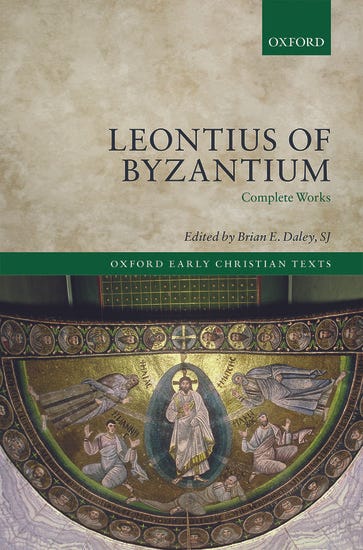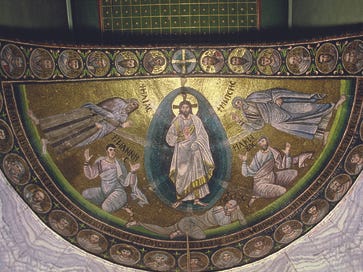
Review of Leontius of Byzantium: Complete Works
Daley, Brian E. ed. Leontius of Byzantium: Complete Works. Oxford Early Christian Texts. Oxford University Press, 2017.

Leontius of Byzantium (485-543) was brilliant theologian whose life and activities are relatively unknown today. And yet he was a man ahead of his times, a scholastic before scholasticism became prevalent throughout the Christian world. His scholasticism, however, did not lead him to meditate on obscure questions. His theological writings focus on the centre of the Christian faith, on Christ.
Probably born in Constantinople, that is, Byzantium, he made his way to Palestine "to live the monastic life" (24). After a time of exile, he journeyed to Nea Lavra around "the year 519" (24). In Nea Lavra community who valued Origen and Evagrius, Leontius became a prominent member (24). He returned to Byzantium in 531 during which time he engaged in debates defending "the Christology of Chalcedon against its Severan critics" (24). He became something of theologian in-residence in Byzantium standing against the monophysites who vied for dominance (24-25). With the theological victory won at the Home Synod in 536, he returned to Palestine (25).
And that's around the time when roving monks made themselves ready for war and laid siege to a monastery (7-8). The story is both interesting and paints a picture of the volatile climate of the world in which Leontius lived. Until his death in 532, Sabas led a number of monasteries in Palestine. When he died, Melitas took the reigns of leadership, but Melitas was unable to keep the community united in doctrine. When he died in 537, Gelasius, a disciple of Sabas, arose as a new leader in the region (9). Gelasius perhaps unwisely decided to squash the Origenists among the desert monks. So, he set his sites on the Abbot Nonnus and his followers (9).
Due to the pressure that Gelasisus put on Nonnus, he retreated to Nea Lavra and made his home base there. Gelasius remained at the Great Lavra. With Nea Lavra being a beacon for the Origenists, Origenists monks gathered at Nea Lavra, and they made ready for battle. First, the monks attempted to storm "the monastery of St Theodosius (some 6km north-west of the Great Lavra) and kidnap the hegumen Sophronius and his senior monks" (9) but failed to do so. Next, they armed themselves with peasant reinforcements to attack the Great Lavra. But darkness came upon them, and they again failed in their attack, finding themselves 5 kilometers away at the monastery of St Marcianus (9).
The story sounds like a comedy. A group of monks who meditate and pray all day equip themselves to engage in battle. And unsurprisingly, they were ill-equipped to the task. Leontius would have known about all of this and perhaps participated. Sometime after the failed monkish war, Leontius returned to Byzantium to defend the cause of the Origenists in 539 or 540 (25). A number of years later Leontius died. It was probably around 544 (25).
Part of Leontius's genius was in his clarity in describing the nature of Christ. His greatest contribution might be the way he distinguishes between "the hypostasis, or individual thing, and 'the hypostatic (τὸ [ἐν]υπόστατον),' or that which is individualized: namely, the nature or essence" (29).
Leontius's six extant works are polemical (4). He wrote three works against those who disagreed with Chalcedon and supported Severus of Antioch: Contra Nestorianos et Eutychianos, Epilyseis (aka: Solutiones Argumentorum Severi), and Eparorēmata (4). He wrote Contra Aphthartodocetas to counter Chalcedonian proponents who followed Julian of Halicarnassus in seeing Christ's body as innately incorruptible (4). Against Antiochene Christology, he writes Deprehensio et Triumphus super Netorianos. His final extant work shows how many quotes attributed to the Fathers are actually from "Apollinarius or his followers" (5), which is called Adversus Fraudes Apollinaristarum (4).
Brian Daley has provided an invaluable gift for those interested in early Christian studies and the Christological debates of the fifth century. Daley provides his own translation on one page with a critical Greek text on the other. And this is almost necessary because Leontius's Greek is scholastic, difficult to understand. Daley's translation of Leontius give readers the tools to be able to understand Leontius, to grasp his technical language.
If you have any interest in Byzantine Studies or Christology in the early church, purchase Leontius of Byzantium: Complete Works.
Oxford University Press provided me with a review copy of this work. I was under no obligation to give it a positive review.











